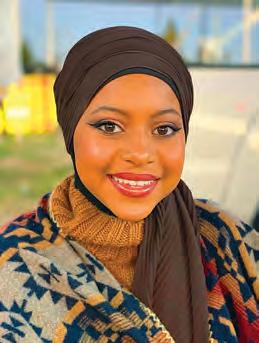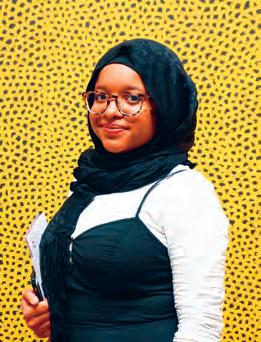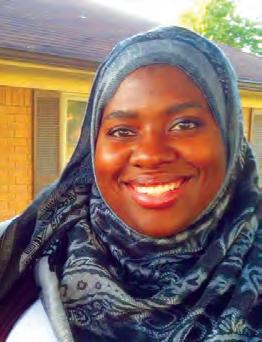
7 minute read
Black Muslimahs
Black Muslimahs: Meanings and Manifestations Hajar’s legacy and the countless generations that came after her
BY BAHEEJAH AALIYAH FAREED
Advertisement
Summayah Abdullah

Baiyinah Abdulla Chaplain Tahara Akmal


Aisha Ruth M. Pratt
Hajar (‘alayhi rahmat), the wife of Prophet Ibrahim and mother of Isma’il, was an African woman whose legacy continues to be performed every year by millions of Muslims. During hajj and umra, we are required to run between the Safa and Marwa, thereby observing a ritual that signifies her resiliency and patience and what the success of her efforts to feed her son ultimately brought to humanity.
Another African woman, Summayah Bint Khabbat (‘alayhi rahmat), played a significant role in Islamic and world history as Islam’s first martyr. Abu Jahl killed this elderly former slave by stabbing and finally impaling her with his spear. Additionally, Haleema Al-Sa’diyyah (‘alayhi rahmat), the Prophet’s (salla Allahu ‘alayhi wa sallam) wet nurse (again of African descent) is honored for nurturing him as a baby and a child.
Many “Black” Muslimahs (some descendants of slaves and servants and others not) have made significant impacts that continue to inspire us all to live for God. Although “Black” American women are often stigmatized as less than anything special in every aspect of life, we now know that this mindset is a mere consequence of the colonization/ slave-owner enforced mentality.
Among the Black women descendants of slaves and well known here and abroad are Harriet Tubman (1822-1913), the abolitionist, political activist and spy for the Union Army in the Civil War, and Madam C. J. Walker (1867-1913). Walker, a community activist and held to be the first female selfmade millionaire, thanks to her cosmetics and hair care products for Black women, was an extremely generous philanthropist and community activist.
LABELS
Anyone who looks like they have African ancestry, especially those with brown skin, is often labeled “Black.” Many “Black” people now claim this title with positivity, although it has been used negatively throughout history. The new mindset uses the analogy of the “black credit card,” which is considered the premium card and represents status. Likewise, Blacks, including and especially descendants of American slaves, have built a legacy of perseverance and making significant contributions to improve their societies and the world at large — a legacy largely created by Black women.
Still we have to choose whether to refute or own the labels the placed upon us by the white supremacist mentality. Perhaps the most common label put on Black women is the “angry black woman,” meaning one who even slightly disagrees with another person, makes her tone firm and asserts her and other peoples’ rights. A young Black Muslim girl named Isra Hirsi decided to tackle this concept and turn it into a positive in her TEDxWakeForestU talk (https://www.youtube.com/watch? reload=9&v=zHvH6ArQV4o).
To be confident, courageous and unapologetically human should not cause Black women to be labeled as “angry.”
MARGINALIZATION
Many Muslim families who arrived during and after the 1960s still feel that Blacks, particularly Black women, are fine to befriend but not to marry. Others pay homage to the strides of Blacks, including Black women, and revere Blacks as worthy of friendship, marriage and any other interactions, just as their own race is worthy.
There is strength and triumph in not focusing on what is trying to work against us, but rather on what we are doing that is good for God’s sake. Despite marginalization, we can operate with serenity, peace of mind, courage, confidence, character and spiritual light. If we concentrate on how
we see others in a positive light, bettering ourselves and, most importantly, how God sees us, we’ll have more success in this life and the hereafter.
When we talk about the marginalization of Black Muslimahs, we also have to talk about marginalization, meaning and manifestations of everyone to some degree. All humans face prejudice in some form, and we all sometimes feel alienated. A blonde, blueeyed White Christian woman (although painted as the epitome of beauty worldwide) may have struggles far more challenging than some Black Muslimahs.
Spending time to get to know one another is important. However, with this pandemic in full effect, it is not the only step in crushing white supremacist control over how we view each other. We first need to do the work within our own hearts, minds, speech and actions by cultivating them in order to reflect our genuine love one another for the sake of God.
BLACK MUSLIMAHS MAKING A DIFFERENCE
■ “No matter what people think, Allah manifests the status of humans. The manifestation of the Black women, in particular, the Black Muslim women are not needy. We are spiritual beings, resilient, survivors, achievers and contributors,” says Sakinah A. Kareem, founder of the nonprofit community-based Jabalu-Nur Foundation (http:// jabalunurfoundation.com).
The Texas-based Jabalu-Nur, originally incorporated in New York State, has been providing sources of aid and technical support to families challenged financially, socially and otherwise for over 25 years. This community organizer, along with her team of family members, volunteers and donors, provides job training programs, food programs, Our Sacred Space resource center for women, Eid al-Adha Carnival Celebrations for orphaned and refugee children, financial aid in times of emergency and marriage counseling (with her husband Malik). She has helped develop a school for over 600 students in an African village. ■ Ustadha Ieasha Prime (http://www. ieashaprime.com) converted over 20 years ago, after her term as an International Youth Ambassador to Morocco and Senegal.
WHEN WE TALK ABOUT THE MARGINALIZATION OF BLACK MUSLIMAHS, WE ALSO HAVE TO TALK ABOUT MARGINALIZATION, MEANING AND MANIFESTATIONS OF EVERYONE TO SOME DEGREE. ALL HUMANS FACE PREJUDICE IN SOME FORM, AND WE ALL SOMETIMES FEEL ALIENATED. A BLONDE, BLUE-EYED WHITE CHRISTIAN WOMAN (ALTHOUGH PAINTED AS THE EPITOME OF BEAUTY WORLDWIDE) MAY HAVE STRUGGLES FAR MORE CHALLENGING THAN SOME BLACK MUSLIMAHS.
During that time, she officially began studying Islam. Upon her return, while enrolled in an Islamic studies course taught by professor and scholar Mohammad Arafat at the Islamic Center in Washington, D.C., she embraced Islam. Since then, she has spent her life as an educator, artist, activist and entrepreneur committed to empowering Muslimahs to maximize their full potential as female servants of God and His vicegerents on this planet. ■ Baiyinah and Summayah Abdullah are directing and facilitating Houston’s ArtworkIn-Residence’s “There Are Black People in the Future” (https://projectrowhouses.org/) program. A University of Houston graduate, Baiyinah is a ninth grade biology teacher based on Karankawa land in Houston.
As an educator, she promotes culturally responsive pedagogy and scientific literacy. As a scientist, she is a birder, bird banding volunteer and student of environmental justice. As a Black birder and educator, Baiyinah is fully involved in community healing, restorative justice, equity in education and the outdoors.
Summayah, a University of Houston senior, is majoring in human development and family studies and minoring in psychology. A passionate worker in the nonprofit sector, she believes that sector can help bridge social inequities. She has held various titles at Helping Hand for Relief and Development (https://new.hhrd.org/) in Houston. As marketing director at Muslim Inter-Scholastic Tournament (MIST; http://www.misthouston.com/#mist-houston-home) in that city, she thoroughly enjoyed working with competitive Muslim youth. With parents from Ohio and having grown up in a 12-person, 4-generation household in Galveston, Texas, she shares a passion for understanding local Black history, the connectedness of Houston/ Galveston and how migration connects Black American stories nationwide. ■ Chaplain Tahara Akmal, the mother of two sons and a daughter, joined Moravian Theological Seminary in 2017 to teach in the chaplaincy program. She now serves as Manager of Clinical Pastoral Education (CPE) and Chaplain at MedStar Washington Hospital Center in Washington, D.C. An Islamic Seminary of America board member, she has had years of training and experience in chaplaincy. Her graduate studies internship project focused on end-of-life care practices and rituals in Judaism, Catholicism, Islam and Buddhism.
She also conducted a research project entitled “Islamic Law and Medical Ethic; Organ Transplant, Defining Death, and Life Sustaining Devices.” In October 2016, Chaplain Tahara received the Muslim American Chaplain’s Association lifetime Achievement Award, which is given annually to an individual who demonstrates excellence in service to humanity (https://www. islamicseminary.us/leadership/). ■ Karima Al-Amin, an immigration lawyer in Clarkston, Ga., graduated from Atlanta’s John Marshall Law School and has been a Georgia State bar member since 1996. She has also joined several legal and community organizations, including the American Immigration Lawyers Association, the Clarkston Business Association and the Georgia Association of Muslim Lawyers (www.aafia.org). ■ Nurse and personal trainer Tahira Osama, who has a 16-year background in nursing and a passion for fitness, opened her Acapella Dance Fitness (ADF; https:// acapelladancefitness.com) studio in April 2016. Her goal in doing so was to inspire women to put themselves first and live healthier lives and provide a safe non-judgmental environment where they can focus on becoming healthier mentally, physically and emotionally. ■ Bahiyah AmatuAllah Diouf, who now cares for her 91-year-old mother who










